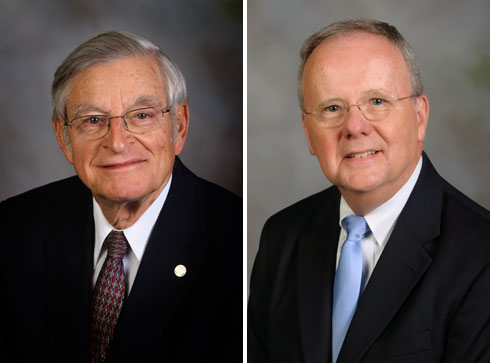Virginia Tech's James Mitchell, Edward Spencer receive Significant Sig Awards from Sigma Chi Fraternity

Distinguished Professor Emeritus James Mitchell and Vice President for Student Affairs Edward Spencer will receive Significant Sig Awards from Sigma Chi Fraternity for their outstanding professional achievements and lifelong dedication to civic endeavors.
The award is the fraternity’s highest honor, recognizing alumni members for the distinction their career achievements and community involvement bring to the Greek-letter organization. Past recipients include House Minority Whip Steny Hoyer, hotel corporation executive Bill Marriott, and New Orleans Saints quarterback Drew Brees.
The Significant Sig Awards will be presented at the Sigma Chi Grand Chapter meeting June 25 in Dallas, Texas. Other Sigma Chi alumni who will receive the award this year include Tennessee Gov. Bill Haslam and actor and philanthropist Brad Pitt.
Mitchell has taught in the Department of Civil and Environmental Engineering in the College of Engineering at Virginia Tech since 1994, and previously served on the faculty at the University of California, Berkeley from 1958-1993. He served as a leading engineering consultant for the NASA moon landings as well as reviewed the work of the Army Corps of Engineers following Hurricane Katrina’s landfall in New Orleans in 2005. He received his bachelor’s degree in civil engineering from Rensselaer Polytechnic Institute and his master’s degree and Sc.D. from the Massachusetts Institute of Technology.
Spencer served as advisor to the Sigma Chi Fraternity chapter at Virginia Tech for 20 years and has also served as a national officer and committee and board member for the fraternity. A member of the Virginia Tech community since 1983, Spencer provides executive leadership for the 15 departments in the university’s Division of Student Affairs and teaches in the Higher Education Administration graduate program in the College of Liberal Arts and Human Sciences. He received his bachelor’s degree from the University of Rochester, a master’s degree from Syracuse University, and a master’s degree and Ph.D. from the University of Delaware.







